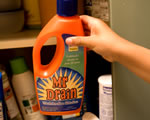 Go to main content
Go to main content
Archive Website of the UK government
Please note that this website has a UK government accesskeys system.
Main menu
Page menu
Parents

Keeping children safe from poisonous substances

Every week around 500 children under five are rushed to hospital because it's thought they have swallowed something poisonous. Find out how putting a few simple measures in place can stop this happening to your child.
Storing medicines
Keep medicines well out of reach and out of sight of young children. Put them in a high cupboard, a cupboard fitted with a child-resistant catch, a lockable cabinet, or even a lockable suitcase. Don’t keep them:
- on your bedside table – your child can easily get into the bedroom without being seen
- in your handbag – this is a favourite place for toddlers to find tablets
- in the fridge – ‘keep cool’ usually means keep away from direct sunlight or warm places like radiators
If a medicine needs to be kept in the fridge it will say so on the box. If it does, keep it as high up and hidden as possible.
Medicines - general tips
- keep the caps closed on medicine bottles and put all medicines away immediately
- remember that while child-resistant caps may slow a child down, they are not child-proof
- keep all medicines in their original containers so it is clear what is in them and it is harder for children to open them
- take extra care with tablets in see-through packs or brightly coloured tablets – they are especially tempting to children
- don’t count out your tablets for the day and then leave them lying around
- take your medicine when your child isn’t around so they don’t try to copy you
- teach your child about the safe use of medicines and never pretend they are sweets
- take left-over medicines to your local chemist for them to throw away safely
- keep an eye on your children in other people’s houses as they may not follow the same safety rules as you
Storing household chemicals and products
- keep all household chemicals and cleaning products - including detergent tablets for the dishwasher or washing machine - out of sight and in cupboards with child-resistant catches
- keep potentially harmful products high up and out of reach – never under the sink or on the floor by the toilet
- move products out of reach if you are called away while using them – for example if the phone rings while you are cleaning the toilet
- dispose of empty containers safely and out of your child’s reach
Household chemicals and products – general tips
- look for products with child-resistant caps but remember this does not make them child-proof – some children as young as three can open them in seconds
- remember that detergent capsules come in boxes that aren't child-resistant
- look for products with a bittering agent – this makes them taste horrible and helps stop young children swallowing them
- remember that cigarettes, alcohol, perfume, aromatherapy oils and mouthwash can all be poisonous to children
- never strip old furniture or paintwork when there are young children (or pregnant women) present – the dust may contain lead which is harmful
Storing chemicals outdoors
- keep all chemicals like paint, white spirit, oil, anti-freeze, weed-killers and pesticides high up, out of reach and out of sight
- fit a padlock to the cupboard, shed or garage where they are kept
- keep all chemicals in their original, labelled containers – do not put them into another bottle or container
Carbon monoxide poisoning
Carbon monoxide is a poisonous gas which can build up when household appliances that use flames - like boilers, water heaters, stoves or open fires - are faulty and are not getting enough oxygen to burn efficiently. Carbon monoxide is particularly dangerous as it has no smell, taste or colour, so it is very difficult to know when it is being produced.
You can guard against carbon monoxide poisoning by doing the following:
- fit carbon monoxide alarms wherever there is a flame-burning appliance
- make sure you keep ventilation outlets in your home free from blockages
- have your flame-burning appliances regularly serviced by a qualified engineer
First aid
If you think your child has swallowed a harmful medicine or chemical:
- get advice immediately from your pharmacist, doctor or accident and emergency department – or call NHS Direct on 0845 4647
- find the bottle or packet and take it with you if you go to the hospital
- don’t give your child salt water or anything else to make them sick
- don’t give your child anything to drink – just wet their lips with cold water if they are burning
- if the child is unconscious or there is burning to the mouth, dial 999 immediately to call an ambulance
Child Accident Prevention Trust (CAPT)
The information on this page is provided by CAPT. For more information about children’s accidents visit the Child Safety Week website.
 Facebook
Facebook Twitter
Twitter StumbleUpon
StumbleUpon Delicious
Delicious Reddit
Reddit